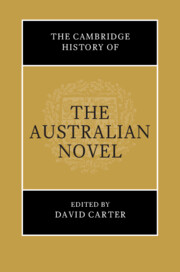Book contents
- The Cambridge History of the Australian Novel
- The Cambridge History of the Australian Novel
- Copyright page
- Contents
- Figures
- Contributors
- Acknowledgements
- Introduction
- 1 The Global Invention of the Australian Novel
- 2 Colonial Adventure Novels
- 3 Beyond Britain and the Book
- 4 Transnational Optics
- 5 The Novel in the Late Colonial Period
- 6 Love Is Not Enough
- 7 The Australian Crime Novel, 1830–1950
- 8 The Novel Nation
- 9 Selling Australian Stories to the World
- 10 Women Writers and the Emerging Urban Novel, 1930–1952
- 11 The National Trilogy and Mining
- 12 Nation and Environment in the Twentieth-Century Novel
- 13 Henry Handel Richardson, Christina Stead and the Transnational Fiction of Provincial Development
- 14 The Mid-Century Australian Novel and the End of World History
- 15 Race, Romance and Anxiety
- 16 Whiteness, Aboriginality and Representation in the Twentieth-Century Australian Novel
- 17 When the Twain Meet
- 18 From Bunyip to Boom
- 19 Unsettling Archive
- 20 The Novel at Arms
- 21 ‘Our Least-Known Best Seller’
- 22 Writing, Women and the Australian Novel
- 23 White Lies
- 24 The Economics of the Literary Novel
- 25 Mabo, History, Sovereignty
- 26 Indigenous Futurism
- 27 The Regional Novel in Australia
- 28 Children’s and Young Adult Literature
- 29 Grunge, Nation and Literary Generations
- 30 The Making of the Asian Australian Novel
- 31 Screening the Australian Novel, 1971–2020
- 32 Australian Fantasy, Crime and Romance Fiction in the Twentieth and Twenty-First Centuries
- 33 Uncertain Futures
- 34 A (Sovereign) Body of Work
- 35 The Novel Road to the Global South
- 36 The Fortunes of the Miles Franklin
- 37 The Arab Australian Novel
- 38 Riddling the Nation
- 39 Migrant Writing and the Invention of Australia
- Selective Bibliography: Studies of the Australian Novel, 2000–2021
- Index
33 - Uncertain Futures
Climate Fiction in Australian Literature
Published online by Cambridge University Press: 28 June 2023
- The Cambridge History of the Australian Novel
- The Cambridge History of the Australian Novel
- Copyright page
- Contents
- Figures
- Contributors
- Acknowledgements
- Introduction
- 1 The Global Invention of the Australian Novel
- 2 Colonial Adventure Novels
- 3 Beyond Britain and the Book
- 4 Transnational Optics
- 5 The Novel in the Late Colonial Period
- 6 Love Is Not Enough
- 7 The Australian Crime Novel, 1830–1950
- 8 The Novel Nation
- 9 Selling Australian Stories to the World
- 10 Women Writers and the Emerging Urban Novel, 1930–1952
- 11 The National Trilogy and Mining
- 12 Nation and Environment in the Twentieth-Century Novel
- 13 Henry Handel Richardson, Christina Stead and the Transnational Fiction of Provincial Development
- 14 The Mid-Century Australian Novel and the End of World History
- 15 Race, Romance and Anxiety
- 16 Whiteness, Aboriginality and Representation in the Twentieth-Century Australian Novel
- 17 When the Twain Meet
- 18 From Bunyip to Boom
- 19 Unsettling Archive
- 20 The Novel at Arms
- 21 ‘Our Least-Known Best Seller’
- 22 Writing, Women and the Australian Novel
- 23 White Lies
- 24 The Economics of the Literary Novel
- 25 Mabo, History, Sovereignty
- 26 Indigenous Futurism
- 27 The Regional Novel in Australia
- 28 Children’s and Young Adult Literature
- 29 Grunge, Nation and Literary Generations
- 30 The Making of the Asian Australian Novel
- 31 Screening the Australian Novel, 1971–2020
- 32 Australian Fantasy, Crime and Romance Fiction in the Twentieth and Twenty-First Centuries
- 33 Uncertain Futures
- 34 A (Sovereign) Body of Work
- 35 The Novel Road to the Global South
- 36 The Fortunes of the Miles Franklin
- 37 The Arab Australian Novel
- 38 Riddling the Nation
- 39 Migrant Writing and the Invention of Australia
- Selective Bibliography: Studies of the Australian Novel, 2000–2021
- Index
Summary
Australian novelist George Turner’s 1987 novel The Sea and Summer is one of the world’s first climate fiction novels, although James Edmond’s 1911 story, ‘The Fool and His Inheritance’, is a precursor to the genre. The early emergence of Australian climate fiction is not surprising given the country’s vulnerability to anthropogenic climate change. This chapter investigates the 35-year history of Australian climate fiction through an analysis of six novels, contemplating how environment, history and culture shape the use of genre, form and theme. It examines slow violence and flooding in The Sea and Summer; the intertwining of colonisation, environmental destruction and dispossession in Alexis Wright’s The Swan Book (2013); the use of the uncanny to explore the impact of ‘settlement’ in Jennifer Mills’s Dyschronia (2018); the effect of a changing climate on generations in James Bradley’s Clade (2015); and the psychological ramifications of the 2019–20 bushfires, evident through motifs of missing bodies and an invisible menace in Richard Flanagan’s The Living Sea of Waking Dreams (2020) and Inga Simpson’s The Last Woman in the World (2021). These novels, which are shaped by their production in a country with a fragile environment and a history of colonisation, offer varying visions of hope and despair.
Keywords
- Type
- Chapter
- Information
- The Cambridge History of the Australian Novel , pp. 557 - 574Publisher: Cambridge University PressPrint publication year: 2023



